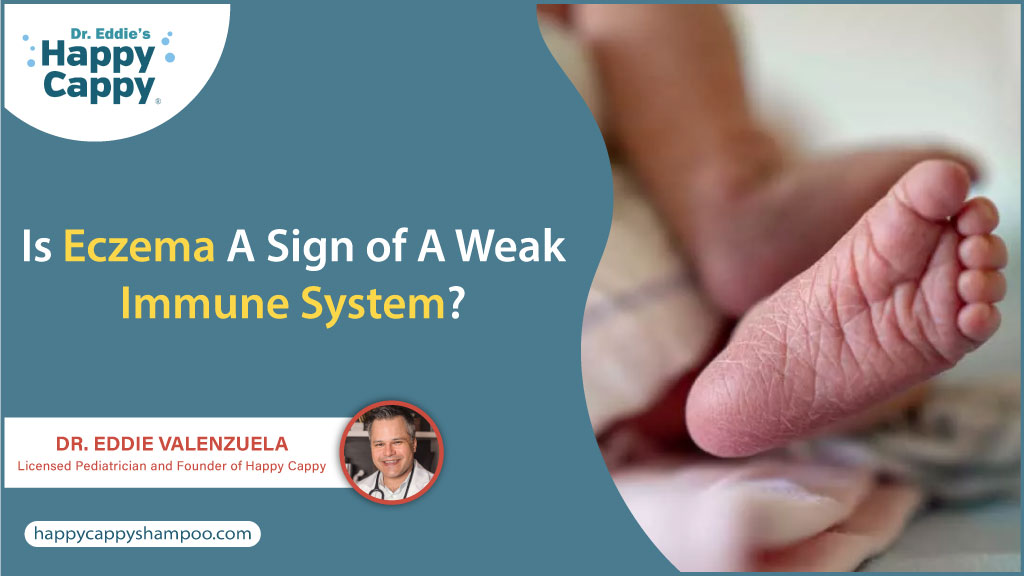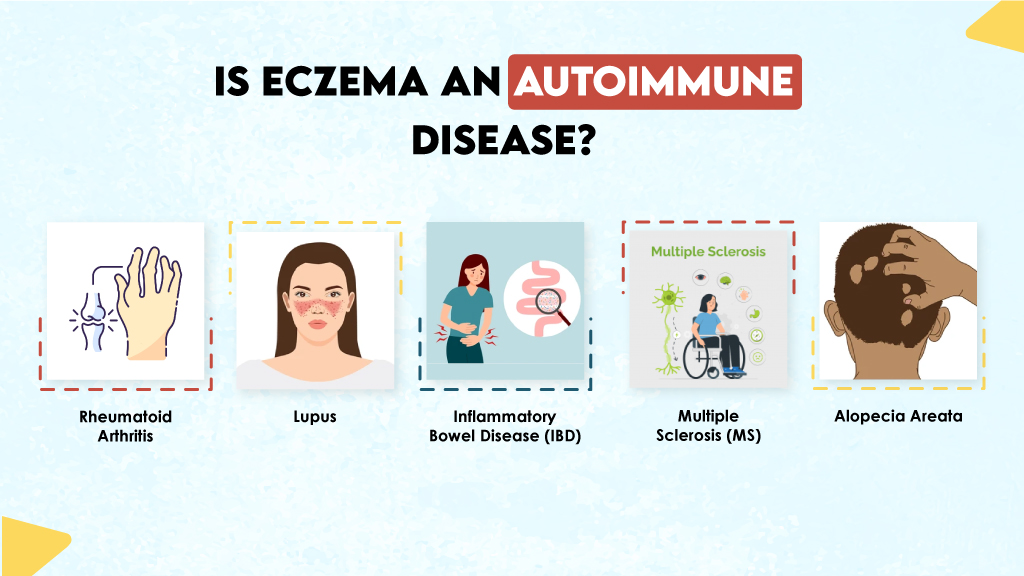
Eczema’s facets are still a mystery, even to the experts. What causes it the most? Why does the body overreact to our everyday environment? A big worry for Eczema patients Is whether it is a sign of a weak immune system.
The Relation Between Eczema and Immune System
Eczema is linked to the immune system and the body’s response to irritants. These everyday irritants are frustratingly common in daily life — ranging from heat to cold to wind or soap, dander, and even stress. Another interesting immunological tie is that people who have a family or health history of the following conditions are more likely to develop eczema.
- Allergies
- Asthma
- Hay fever
Allergies and asthma are known examples of an overactive immune system. However, an overactive immune system is different from a weak one. What does it mean? Is this your skin that is lacking the essential nutrients? Or shall we say… “It needs high maintenance”!
Is Eczema a Sign of a Weak Immune System?
Now the question arises does having eczema mean you have a weak immune system? The answer is No! In fact, it’s because of an overactive or more sensitive immune system, as it reacts toward certain things that are not even harmful to the body.
However, it is true that eczema is triggered by a weak skin barrier. Skin barrier dysfunction makes it hard for the epidermis to protect itself against outside irritants and retain moisture in the skin.
So when these irritants penetrate into the skin, your immune system identifies them as harmful invaders and tries to protect you by triggering the white blood cells. These white blood cells release certain types of chemicals known as cytokines and histamines.
These chemicals, as a reaction, cause the iconic inflammation, irritation, and redness associated with eczema. The stress brought on by powerful eczema flare-ups can stress your immune system, which is one more reason why people think eczema equals a weakened immune system.
Why Do I Always Get Infections if My Immune System Isn’t Weak?
With the most common type of eczema – Atopic Dermatitis – your skin barrier is off-balance and/or damaged, requiring extra care to stay hydrated and healthy. Without the extra TLC eczema demands, a broken skin barrier will develop rough, dry patches, cause itching and discomfort, and ultimately – let in germs.
Once the germs have penetrated your broken skin barrier, you suffer infections and will likely need antibiotics. Your doctor may also prescribe creams and ointments with corticosteroids to ease inflammation. Keeping a gentle body wash for eczema at home can also be helpful.
People who have inherited immune deficiency, like autosomal dominant hyper-IgE syndrome (AD-HIES), usually experience eczema symptoms like redness, rashes, and flaky skin. This condition also makes them more prone to developing skin infections.
So if you are experiencing skin infections, it is best to consult a doctor to get an accurate diagnosis and the right treatment plan.
Is Eczema an Autoimmune Disease?

According to the National Eczema Association, an autoimmune disease is when your immune system mistakenly starts attacking your body’s own cells, tissues, and organs. Some common autoimmune diseases that can cause symptoms similar to those of eczema are:
- Rheumatoid arthritis
- Lupus
- Inflammatory bowel disease (IBD)
- Multiple sclerosis (MS)
- Alopecia areata
Even though these conditions may cause similar symptoms, however, eczema is not an autoimmune disease. Because in eczema, your immune system only becomes overactive and tries to protect you instead of attacking your own body.
Soothing Eczema
The good news is that the key to preventing most flare-ups and infections is a healthy skin regimen – entirely in your hands.
To calm your taxed immune system and relieve red, angry, itchy skin – or better yet, to try and prevent eczema flare-ups, using a moisturizing cream for eczema is an easy yet essential step.
You’ll have to select a cream formulated without any harsh ingredients, such as:
- Fragrances
- Sulfate
- Paraben
- Artificial dyes
- Phthalates
- Dimethicone
Especially for skin conditions like eczema, seborrheic dermatitis, also known as cradle cap, and sensitive skin. An eczema cream that contains natural skin-soothing ingredients like licorice root extract and apple fruit extract is a great option to choose.

If you are looking for eczema products that are safe for sensitive skin, try Happy Cappy Two-Step Eczema Skincare Routine, it will help soothe your eczema symptoms, moisturize the skin, and restore the skin’s natural barrier.
A few other things that you must incorporate into your life that will help prevent an eczema flare-up are:
- Use lukewarm water to wash your body and to take a bath.
- Make your bath time short, a maximum of 10 minutes.
- Moisturize your skin at least twice daily or as required.
- Use a humidifier if the air becomes dry to prevent your skin from getting dry.
- Avoid any skincare products with harsh chemicals.
- Use gentle, fragrance-free detergent to wash your clothes.
- Use sunscreen or cover your body to protect it from direct sunlight.
If your condition does not get better even after proper care and attention, then consult a dermatologist. They may prescribe the use of medications or help you provide an accurate diagnosis of your condition. There is a chance you may have confused other similar conditions like psoriasis, rosacea, and ringworm for eczema.
Conclusion
Eczema is not a sign that you have a weak immune system. However, it means that you have an overactive or sensitive immune system. Eczema causes an impaired skin barrier, which makes it difficult for the skin to retain moisture and protect your skin against irritants. Your immune system may perceive not-so-harmful irritants as dangerous for you and protect your body by releasing certain cells and chemicals.
These chemicals can cause the itching, redness, irritation, and inflammation associated with eczema. However, you can easily help your skin by strengthening its skin barrier with the use of an eczema moisturizing cream to keep your skin moisturized all the time.
FAQs
Can eczema be a sign of autoimmune?
Eczema does share similar symptoms to those you may experience if you have an autoimmune disease. However, eczema is not an autoimmune condition, as it does not attack your body’s own cells, tissues, and organs.
Is my immune system weak if I have eczema?
No, having eczema does not mean you have a weak immune system. However, it does mean that your immune system is oversensitive or overactive and may try to protect your body against irritants that may not be harmful to you.
Is eczema a sign of something more serious?
Eczema is usually not a sign of a serious underlying disease. However, when proper care is not provided to the skin, it can cause your eczema to become infected and lead to serious issues.
Why am I so prone to eczema?
People who have a family or health history of eczema, asthma, hay fever, and allergies are more prone to developing eczema.
